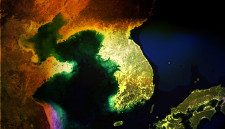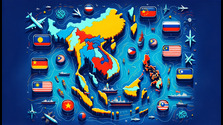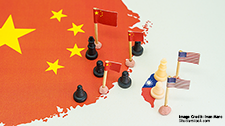Japan`s Policy towards the South China Sea – Applying “Proactive Peace Diplomacy”?
Japan’s policy towards the South China Sea (SCS) is likely to have a considerable bearing on the future shape of the regional order in this region although ultimately US-China competition and the reaction of the other countries around the SCS will have a more decisive bearing.
As China is reinforcing its claims to most of the SCS through political, economic, military and legal means, Japan has become more involved as one of the top world trading nations with considerable political, economic and strategic interests in Southeast Asia, as a security alliance partner of the US, and as a country which has territorial as well as Exclusive Economic Zone (EEZ) border disputes with China in the East China Sea (ECS).
This involvement has to be seen against the background of the general deterioration in the Japanese-Chinese relationship and lack of mutual trust which is due to not only the disputes in the ECS, but also to mutual suspicion generated by sharply diverging perceptions of military developments in the other country, the way Japan confronts its past aggression, and competitive if not antagonistic regional roles. China’s SCS policies therefore fit into Japan’s narrative of the “China Threat”, whereas Japan’s SCS policies fit into China’s narrative of Japan as a troublemaker at the side of the US.
Related Publications
-
Risk Reduction and Crisis Management on the Korean Peninsula
The situation on the Korean Peninsula is inherently intertwined with the growing instability of the East Asian security environment, where high tensions significantly increase the risk of unintended incidents and armed […]
-
China as a Mediator in North Korea: Facilitating Dialogues or Mediating Conflicts?
China has arguably emerged as a major power militarily, politically, and economically, extending its influence globally and within its immediate region. This influence has been increasingly asserted, as seen in […]
-
Strategic Standoffs: How Repeated Games Illuminate the Future of South China Sea Disputes
Introduction The motivation to put this piece together was observing the recent bizarre and, dare I say, childish behaviour of the Chinese Coast Guard in the South China Sea (SCS), […]
-
Taiwan and the Diplomatic Squeeze
In mid-March 2023, the self-governing island of Taiwan lost another one of its already few diplomatic allies. Announcing the severing of diplomatic ties between Taiwan and Honduras on Twitter on March 15, […]
-
Taiwan-PRC Crisis: What Cross-Strait Conflict Could Cost Europe
The escalating tensions between Taiwan and China pose significant economic and strategic challenges to the European Union, such as the inaccessibility of Taiwanese inputs, market, and capital. This issue brief […]




